Despite its relocation from mid-17th century Seville to the catacombs of Vienna in the early 1900s, John Lloyd Wood’s realisation of Mozart’s perennially popular morality tale is a gratifyingly conventional affair. One in which the anti-hero, in the director’s own words, is concerned more about his masculine identity than the women he seduces. In asserting his own masculinity, his primary concern is not sexual gratification but the humiliation of The Commendatore, Don Ottavio and Masetto.
 This show is about the imposition of power on the powerless, and it rattles along with tremendous energy and wit, underpinned by a brooding intensity that never flags. Eschewing all unnecessary gimmicks (no heroin, squalid bathrooms or Nazis here), the production offers new insights while remaining respectful of the music and the libretto. Which is more than can be said for the translation by Jeremy Sams. Though undeniably funny, the urge to make da Ponte’s libretto modern and relevant results in too many departures from the text, some sufficiently egregious as to completely derail the original meaning. What was elegant, witty and suggestive becomes coarse, slapstick and explicit. The word ‘bastard’ certainly does not offend me, but I lost track of the number of times it popped up. Occasionally it is reminiscent of the stand-up comedian who believes that swearing is in itself comic, and consequently stops trying to be genuinely funny. Leporello’s Catalogue Aria veers off into a depiction of priapism that is a startling departure from the librettist’s verse. Ultimately, this may or may not matter to you, and I would be fibbing if I tried to pretend that I didn’t laugh. A lot.
This show is about the imposition of power on the powerless, and it rattles along with tremendous energy and wit, underpinned by a brooding intensity that never flags. Eschewing all unnecessary gimmicks (no heroin, squalid bathrooms or Nazis here), the production offers new insights while remaining respectful of the music and the libretto. Which is more than can be said for the translation by Jeremy Sams. Though undeniably funny, the urge to make da Ponte’s libretto modern and relevant results in too many departures from the text, some sufficiently egregious as to completely derail the original meaning. What was elegant, witty and suggestive becomes coarse, slapstick and explicit. The word ‘bastard’ certainly does not offend me, but I lost track of the number of times it popped up. Occasionally it is reminiscent of the stand-up comedian who believes that swearing is in itself comic, and consequently stops trying to be genuinely funny. Leporello’s Catalogue Aria veers off into a depiction of priapism that is a startling departure from the librettist’s verse. Ultimately, this may or may not matter to you, and I would be fibbing if I tried to pretend that I didn’t laugh. A lot.
There are just a couple of missteps in the staging. Not being able to see the Commendatore during the graveyard scene robs it of any frisson of fear. Having him sing from offstage results in the voice losing presence and impact. It’s a rare case where some special-effect amplification with plenty of reverb would not go amiss. Zerlina suffers badly in her first-act aria ‘Batti, batti’. Da Ponte’s gentle innuendo is supplanted by a garish explicitness that turns the scene into a cross between a Carry On movie and a Donald McGill seaside postcard.
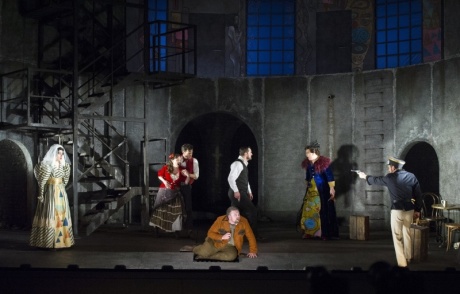 Anna Fleischle’s stage designs work beautifully with the director’s vision. The monolithic semi-circular set that hugs the back and sides of the stage pulls off the trick of providing a substantial space for the action to play out in, while creating a claustrophobic oppressiveness. The single multi-level iron staircase on one side is put to constant use as a vehicle for entrances, exits and hiding places. Don Giovanni is costumed in suave black, Donna Anna and Don Ottavio seem to have stepped straight off the set of A Room With a View, and Donna Elvira could have been created by Gustav Klimt. Zerlina and Masetto are clad in conventional peasant attire. The lighting is constantly moody and, when the Don gets his infernal comeuppance, Guy Hoare proves that meagre resources are no barrier to the creation of a scarily believable underworld.
Anna Fleischle’s stage designs work beautifully with the director’s vision. The monolithic semi-circular set that hugs the back and sides of the stage pulls off the trick of providing a substantial space for the action to play out in, while creating a claustrophobic oppressiveness. The single multi-level iron staircase on one side is put to constant use as a vehicle for entrances, exits and hiding places. Don Giovanni is costumed in suave black, Donna Anna and Don Ottavio seem to have stepped straight off the set of A Room With a View, and Donna Elvira could have been created by Gustav Klimt. Zerlina and Masetto are clad in conventional peasant attire. The lighting is constantly moody and, when the Don gets his infernal comeuppance, Guy Hoare proves that meagre resources are no barrier to the creation of a scarily believable underworld.
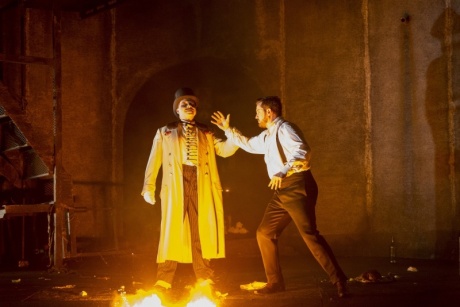
British bass Matthew Stiff pretty much steals the show as a shambling, sonorous-voiced Leporello. Always funny and frequently hilarious, his singing is marked by a wonderful feeling for line that makes this so much more than the usual buffo performance.
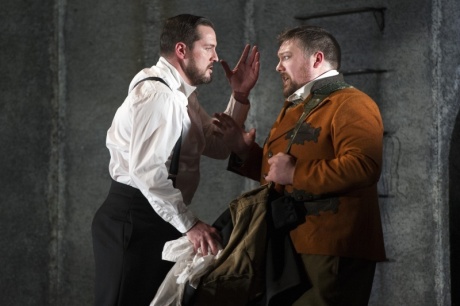
Oozing charisma in the title role, George von Bergen is a virile and athletic presence throughout. His heart-stopping leap from the upper level of the set, pursued by Donna Anna, on his first entrance sets the tone for the rest of his performance. His humiliation of Elvira in the supper scene as he throws food and wine at her is unsettlingly sadistic. This British baritone is possessed of a sumptuous voice that is full of warmth, but the aggression with which he attacks the music can, at times, be wearing and makes one slightly concerned for his vocal longevity. Heard to best advantage when singing full out, there seem to be some issues at lower dynamic levels, where sudden bulges in the sound adversely impact the overall line. He seemed taxed by the lung-bursting ‘Finch’an del vino’ despite audibly conserving his resources during the first half of the aria. It would be remiss not to note the thunderous high A that the Commendatore’s icy grasp elicits from him.
The young baritone Bradley Travis is an engaging and hyperactively angry Masetto. As the Commendatore, Tim Dawkins, though slightly lighter of voice than is ideal for this role has no problem imposing himself on the supper scene.
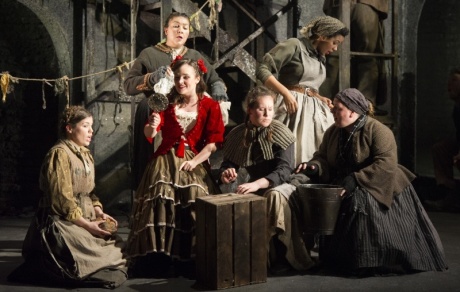
Lucy Hall is a firecracker Zerlina, bristling with feisty energy and impossible not to watch no matter who else is on stage. After a slightly uneven start, her soubrette soprano settled down beautifully. Though small, its brilliance enables it to cut easily through ensembles. She commits herself wholeheartedly to a heavily sexualised interpretation of the role.
Soprano Camilla Roberts, though possessing the necessary weight of voice, was audibly taxed by the role of Donna Anna. The middle and lower registers are secure and powerful but, in this performance at least, there seemed to be issues with the top of the voice which left her struggling. She found the technical demands of ‘Or sai chi l’onore’ and ‘Non mi dir’ difficult to overcome.
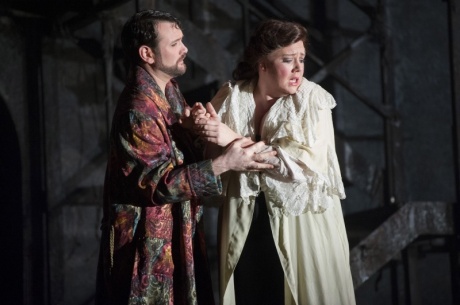
Robyn Lyn Evans manages to elevate Don Ottavio above his usual status as opera’s ultimate wimp. His bright Italianate tenor makes relatively easy work of ‘Il mio tesoro’. For some reason, he is deprived of the opportunity to sing his first act aria, ‘Dalla sua pace’.
As Donna Elvira, Polish soprano Ania Jeruc is a wonderful Donna Elvira, creamy of voice and commanding of presence. It is a great shame that she is not allowed to sing ‘Mi tradì’ in Act 2. Unfortunately, she seemed to be fighting a losing battle with the English language, some ungainly vowels detracting from what was otherwise some very beautiful singing.
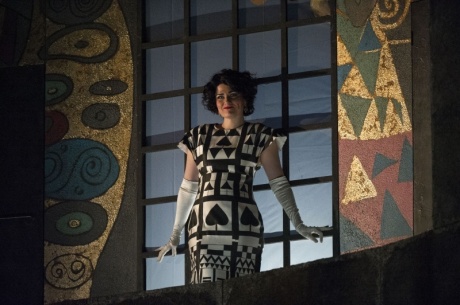
There was some lovely Mozartean wind playing from the pit. Michael Rosewell drives the music insistently forward, never allowing the pace to flag for a second. He coaxes a remarkable depth of sound from his small orchestra.
This is a show that is consistently greater than the sum of its parts. Flawed in places but always gripping and persuasive. One of the more enjoyable Don Giovannis this reviewer has seen in recent years.
4 stars
Steve Silverman
(Photos : ETO website)